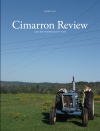Cimarron Review – Summer 2013
The hallmark virtues of this issue of Cimarron Review are polished works that are immediately accessible yet amply reward closer inspection.
The hallmark virtues of this issue of Cimarron Review are polished works that are immediately accessible yet amply reward closer inspection.
The tone is set by April Dobbins’ front and back photos of old tractors. They have ordinary Middle America written all over them—the magazine, after all, hails from Oklahoma, and not much of it has a big-city feel. But look at the small, square, mysterious wooden-looking object perched on one wheel, the electric lines crossing and sagging overhead, the missing “D” after “FOR” on the grill. They’ll set your responses going.
Lesley Wheeler, whose Heterotopia won the Barrow Street Press Poetry Prize, gets things started inside with two fine poems. The first, “Distractible,” evokes spring in buzzed-out, flip-card images of nature, youth, sex, and all the rest, including a sly dig at one of modern poetry’s canonic takes on the season: “April, you cruel, you sexy / month, you burn winter’s / secret skin sudden pink.”
Eliot’s poem shows up again in the other poem by Wheeler, “Powder Burn,” which describes a face-off at a party between a suspended blue-collar cop and an English major “eager to discuss / Native Son or participial line breaks / in The Waste Land.” At the end, through the ameliorating lens of memory, the poet finds her way across the social gulf to a well-earned empathy for both characters.
In the short fiction section, Philip Holland’s “Mentor” memorably tells the tale of Rory, a tennis player who had talent to burn—and burned it. “Looking back, he understood that his talent, while the perfect foundation, was also a ceiling. . . . Other players had to work like farmers, spending hours on the court, in the gym, before video screens, with sports psychologists, but not Rory. Or so he thought.” Stuck in an unchallenging job as a tennis club pro, Rory wavers despondently between accepting a job selling cars and trying to make it back on the tour. He finds a sense of commitment, though, with a young student, Conrad, who attends a “special” school. Rory works hard to get past Conrad’s lack of natural ability, and Conrad is an enthusiastic student. But the parents cut the relationship short, seeing no value in it for their son. Then there is a quick jump to a year and a half later and a bitter-sweet ending. Rory, now selling cars, spots Conrad playing tennis in a park—and learns something unexpected about what it means to teach.
Other highlights in this fine issue are Matthew Gavin Frank’s inventive essay on Iowa, “The Fata Morgana in the Loosemeat Sandwich”; Adeena Reitberger’s memoir on her grandmother, a Holocaust survivor; and first-rate poems by Stan Sanviel Rubin, Jeffrey Bean, Jim Daniels, Michael Walsh, and Robert King.
Published by Oklahoma State University, Cimarron Review is one of the most consistently stimulating literary magazines on the scene today.
[cimarronreview.com]





